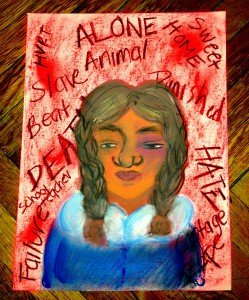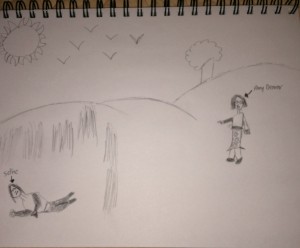The Evidence that Lies
Tanayer Pegues
As she looks around, the voice of Mrs. Peters’ roused her.
“Here’s a bird-cage,” Mrs. Peters said. “Did she have a bird, Mrs. Hale?”
“Why, I don’t know whether she did or not” She turned to look at the cage Mrs. Peter was holding up, “I’ve not been here in so long.” Her guilt starts to rise, the thought of not seeing Mrs. Wright started to haunt her the more she is at the Wrights house. She began to sulk in and let out a huge sigh. “There was a man round last year selling canaries cheap—but I don’t know if Mrs. Wright took one. Maybe she did. Mrs. Wright used to sing real pretty herself”
“Seems kind of funny to think of a bird here” Laughed Mrs. Peters. “But she must have had one–or why would she have a cage”
“I suppose maybe the cat got it,” She suggested, still sulking in her dreadful thoughts.
“No, she didn’t have a cat. She’s got that feeling some people have about cats—being afraid of them. When they brought her to our house yesterday, my cat got in the room, and she was real upset and asked me to take it out.”
“My sister Bessie was like that”, laughed Mrs. Hale. She was trying to find any reason to make herself feel at ease about not seeing Mrs. Wright; looking for any connection to feel as though some how her being there now was “being there” for Mrs. Wright.
With a sudden silence of Mrs. Peter, she turned as asked “What wrong?”
“Look at the door,” said Mrs. Peter. “It’s broke. One hinge has been pulled apart”
She came near to examine it herself and says “Looks as if someone must have been—rough with it.”
As their eyes met–she could tell Mrs. Peters was questioning what has just been discovered. She felt a startled feeling that was mutual to the feeling Mrs. Peter was giving off. All of a sudden a chill ran down her spine which caused her to turn away, she said brusquely:
“If they’re going to find any evidence, I wish they’d be about it. I don’t like this place”
The guilt started to eat at her again as she says “But I tell you what I do wish, Mrs. Peters. I wish I had come over sometimes when she was here. I wish—I had.”
“But of course you were awful busy, Mrs. Hale. Your house — and your children.”
She ignored the comfort Mrs. Peters tried to give her and replied:
“I could’ve come, I stayed away because it weren’t cheerful- – and that’s why I ought to have come. I” – – she looked around – – “I’ve never liked this place. Maybe because it’s down in a hollow and you don’t see the road. I don’t know what it is, but it’s a lonesome place, and always was. I wish I had come over to see Minnie Foster sometimes. I can see now”– She did not put into words.
“Well, you mustn’t reproach yourself,” counseled Mrs. Peters. “Somehow, we just don’t see how it is with other folk’s till– something comes up”
“Not having children makes less work,” she said, after a silence, “but it makes a quiet house– and Wright out to work all day –and no company when he did come in. Did you know John Wright, Mrs. Peters?”
“Not to know him. I’ve seen him in town. They say he was a good man.” Said Mrs. Peters.
“Yes– good, he didn’t drink, and kept his word as well as most, I guess, and paid his debts. But he was a hard man, Mrs. Peters. Just to pass the time of day with him –.” She stopped, shivered a little. “Like a raw wind that gets to the bone.” Her eye fell upon the cage on the table before her, and she added, almost bitterly: “I should think she would’ve wanted a bird!”
Suddenly she leaned forward, looking intently at the cage. “But what do you s’pose went wrong with it?”
“I don’t know,” returned Mrs. Peters; “unless it got sick and died.”
“You didn’t know – – her?” she asked, a gentler note in her voice.
“Not till they brought her yesterday,” said the sheriffs wife.
“She– come to think of it, she was kind of like a bird herself, real sweet and pretty, but kind of timid and — fluttery. How — she — did — change.”
That held her for a long time. Finally, as if struck with a happy thought and relieved to get back to everyday things, she exclaimed:
“Tell you what, Mrs. Peters, why don’t you take a quilt in with you? It might take up her mind”
“Why, I think that’s a real nice idea, Mrs. Hale, there couldn’t possibly be any objection to that could there? Now just what will I take? I wonder if her patches are in here — and her things.” Said Mrs. Peters.
She and Mrs. Peters turned to the sewing basket.
“Here’s some red,” she said, bringing out a roll of cloth, underneath that was a box. “Here, maybe her scissors are in here–and her things.” She held it up. “What a pretty box! I’ll warrant that was something she had a long time ago — when she was a girl.”
She held it in her hand a moment; then, with a little sigh, opened it.
Instantly her hand went to her nose.
“Why- !”
Mrs. Peters drew nearer – – then turned away.
“There’s something wrapped up in this piece of silk,” she faltered.
“This isn’t her scissors,” said Mrs. Peters, in a shrinking voice.
Her hand not steady, she raised the piece of silk. “Oh, Mrs. Peters!” she cried “It’s-“
Mrs. Peters bent closer and said “It’s the bird.”
“But, Mrs. Peters!” she cried. “Look at its neck! It’s all –other side to.” She whispered to herself “Dear Lord, who could have done this. Oh, please don’t let this be the work of Minnie” Her thoughts start to race as she went from thinking it was impossible for Mrs. Wright to commit a crime, to maybe she do this horrible crime. Her thoughts were quickly broken by the sudden movement of Mrs. Peters towards the box. She held the box away from her.
The sheriff’s wife again bent closer.
“Somebody wrung its neck,” said Mrs. Peters.
And then again the eyes of the two women met – this time clung together in a look of dawning comprehension, of growing horror. She watched as Mrs. Peters looked from the dead bird to the broken door of the cage. Again their eyes met. And just then there was a sound at the outside door.
“Well ladies,” said the county attorney, as one turning from serious things to little pleasantries, “Have you decided whether she was going to quilt it or knot it?”
“We think,” began Mrs. Peters in a flurried voice, “that she was going to — knot it.”
“Well, that’s very interesting, I’m sure,” he said tolerantly. He caught sight of the bird-cage. “Has the bird flown?”
“We think the cat got it,” said she in a voice curiously even.
“Is there a cat?” he asked absently.
She shot a look up at the sheriff’s wife.
“Well, not now,” said Mrs. Peters. “They’re superstitious, you know; they leave.”
Mrs. Hale sank into her chair.
“No sign at all of any one having come in from the outside,” he said to Mrs. Peters, in the manner of continuing an interrupted conversation. “Their own rope. Now let’s go back upstairs again and go over it, piece by piece. It would have to have been someone who knew just the –.”
The stair door closed behind the men and their voices were lost.
The two women sat motionless, not looking at each other, but as if peering into something and at the same time holding back.
She said “Mrs. Peters, what we have discovered doesn’t prove anything. We only know that something horrible has happened to that bird.” She starred into space with a deranged look, as though she was trying to convince herself and Mrs. Peters that Mrs. Wright couldn’t possibly hurt the bird.
“So what are you saying? We shouldn’t tell the men about what we found?” asked Mrs. Peters.
“I’m saying since we are not sure ourselves, we should just keep it to ourselves.”
Which title sounds better, A Jury of Her Peers or The Evidence that Lies? The short story I have chosen to retell is A Jury of Her Peers by Susan Glaspell. My reasoning for choosing this story mostly relies on the suspense I felt from reading it and the mystery of not knowing whether Mrs. Wright committed the crime or not. Thus, it’s my turn to possibly change the outcome or the thoughts on whether Mrs. Wright is guilty or not. Third person-omniscient narration is used to tell the story of to tell the original version; I will use third person- limited narration to tell my version, The Evidence that Lies, to give more focus on the character who knows Mrs. Wright better than the others, which is Mrs. Hale.
In the original version of A Jury of Her Peers the author tells the story from point of view of knowing it all. She expresses the feelings and views of every character by explaining how a character feels after they have spoken. This allows the readers to see the story from every angle, therefore we can see what each person thinks about Mrs. Wright and the murder of her husband. She portrayed the men as being bias by statements like: “Well, can you beat the women! Held for murder, and worrying about her preserves!”’, as said by Mr. Peters or “The young attorney set his lips. ‘I guess before we’re through with her she may have something more serious than preserves to worry about.’” It can be assumed that they think Mrs. Wright is guilty of murder without gathering all the evidence that will convict her. The technique of using third person- omniscient narration sort of swayed the story in the favor that Mrs. Wright is guilty due to the fact that more people (all the men) thought she was guilty. This differs from my version in the way that the women (mainly Mrs. Hale) point of view is shown more.
In my version, The Evidence that Lies, I chose to use the scene where the women find the bird cage and the dead bird. This scene was important to me because this was the most important evidence that the men missed. The women two pieces of evidence that could have possibly proved Mrs. Wright guilty, gave her motive or suggest that the Wright household was far more complex then everyone thought. I decided to make Mrs. Hale the focus of my third person- limited narration. It was obvious to choose her because she knew Mrs. Wright more than any person that walked into the Wrights home. In my version I used the words “she” a lot and “her” to express that Mrs. Hale was the focus of my narration; with the adding of her feelings and thoughts I gave the story insight on how she felt through this process of looking for evidence.
For my process of editing my scene of the bird cage, I took out any statements from the original version that would talk about how the other characters felt. This was significant for me because my point of doing the retelling was to get away from all the other characters and focus on one. “But I’m awful glad you came with me, Mrs. Hale.” Mrs. Peters put the bird cage on the table and sat down. ‘It would be lonesome for me – sitting here alone.’”; in contrast to my version where I made everything about Mrs. Hale. ‘“I suppose maybe the cat got it,” She suggested, still sulking in her dreadful thoughts’. In the original version the statement Mrs. Peters made was in there to show how she felt about coming to the house, but I decide that was not relevant to my version because it was not Mrs. Hale feelings.
The end of my version is close to the end of the original version in the sense that, my version leaves you with a thought of “How did they prove she was guilty if that evidence wasn’t submitted?” In the original version at the end of the story the evidence of the bird and bird cage was withheld from men, which I chose to do with my version. I decide to still keep the same suspense that the original version gave me when I found out the men weren’t going to see the bird. My version ended with “So what are you saying? We shouldn’t tell the men about what we found?” asked Mrs. Peters. ‘I’m saying since we are not sure ourselves, we should just keep it to ourselves.’ By having Mrs. Hale tell Mrs. Peters to keep it to themselves I made the ending of my version and the original version give out the same feeling.
When writing my version I didn’t want to stray away from the concept of the original version, only because I agreed with the suspenseful route the author took. I just wanted my version to pay more attention to which I thought was the most important character (Mrs. Hale) beside Mrs. Wright. By taking out statements based on the other characters I think really pushed what I was trying to accomplish; just like by the author incorporating the emotions and thoughts of the other characters she was able to let her readers know who felt what. Both versions had the same tone, setting and plot, but I’d say mines gave Susan Glaspell’s version a run for its money.









